 The greatest grace, the finest gift that God has given us, is to have ‘visited us’, sending His Son. This was a reason for exultation for the elderly Simeon when he welcomed Jesus full of joy with open arms, exclaiming: ‘Now, Lord…you may let your servant go in peace. With my own eyes I have seen your salvation’ (Lk 2:28-32). This visit of Jesus was certainly not a courtesy visit, as today we often understand a visit – it was so wonderful and effective that it ‘saved’ the world from sin and brought the world back to the holiness of its first origins. Equally wonderful and marvellous were the ‘visits’ that God made through two angels. The first announced to the elderly Zachariah that his wife Elisabeth, even though she was sterile and advanced in years, was already expectant and was near to giving birth to a son (Lk 1:11-20). The second announced to Mary, a young woman and a virgin, that she too had conceived a child and would give birth to a son whom she would call Jesus (Lk 1:26-38). These two examples are sufficient for us to understand that in the Bible when God ‘visits’ someone almost always He does something that is beautiful, unexpected, wonderful, but also at times he visits in order to announce chastisement or punishment. If God almost always makes health-giving ‘visits’, we are invited to do the same. In the case of ‘works of mercy’, it is the Lord Himself who invites us to move out of our comforts or homes and visit someone who needs our help or our presence.
The greatest grace, the finest gift that God has given us, is to have ‘visited us’, sending His Son. This was a reason for exultation for the elderly Simeon when he welcomed Jesus full of joy with open arms, exclaiming: ‘Now, Lord…you may let your servant go in peace. With my own eyes I have seen your salvation’ (Lk 2:28-32). This visit of Jesus was certainly not a courtesy visit, as today we often understand a visit – it was so wonderful and effective that it ‘saved’ the world from sin and brought the world back to the holiness of its first origins. Equally wonderful and marvellous were the ‘visits’ that God made through two angels. The first announced to the elderly Zachariah that his wife Elisabeth, even though she was sterile and advanced in years, was already expectant and was near to giving birth to a son (Lk 1:11-20). The second announced to Mary, a young woman and a virgin, that she too had conceived a child and would give birth to a son whom she would call Jesus (Lk 1:26-38). These two examples are sufficient for us to understand that in the Bible when God ‘visits’ someone almost always He does something that is beautiful, unexpected, wonderful, but also at times he visits in order to announce chastisement or punishment. If God almost always makes health-giving ‘visits’, we are invited to do the same. In the case of ‘works of mercy’, it is the Lord Himself who invites us to move out of our comforts or homes and visit someone who needs our help or our presence.
The very term ‘misericordia’ (‘mercy’) already tells us that we are called to engage in compassion and tenderness and to care about the misery, the pain or the loneliness of those whom we visit. We are offered a concrete example of this by Mary who hurries to visit her cousin Elisabeth who needs help because she will shortly give birth to a child. For this reason, Mary goes on a long and arduous journey that takes her from Galilee to the distant mountainous region of Judea. Generously ready to perform all those intimate and familial acts of help that are needed when a child is born, Mary stays with Elisabeth for three months in an atmosphere of joy, of celebration, but also of trepid waiting; singing and dancing for the Lord. And while she narrates the wonders that God has done in her, there springs up from her heart that splendid song of praise, the Magnificat (Lk 1:39-56). Thus when the Church invites us to visit the sick, after a certain fashion she exhorts us to imitate not only the example of Mary but also, and above all else, the example of Jesus who often visited homes that were marked by pain, by mourning or by illness. He certainly had the power to heal every kind of infirmity; we, on the other hand, have the power to visit, to comfort, to share pain or loneliness, to lighten the burdens of those who weep or suffer in body or spirit. This is a visit, therefore, that must be transformed into an act of love, of nearness and of support in moments of sadness and dismay, privileging in our visits not many words but attentive and empathetic listening, above all helping the sick person to free himself from tensions, doubts, remorse and hidden bitterness. Our parishes are for the most part populated by elderly people, most of whom are not self-sufficient, by disabled people, the mentally ill, or cancer patients who are nearly always frightened or terrorised by the bad events that could befall them. We Christians cannot leave them on their own; they are our brothers and sisters, members of one body which is the Church, and in this body the law of solidarity is in force: ‘if one member suffers, all the members suffer together (1Cor 12:12-31).
These visits should, therefore, be made with joy and a smiling face, trustingly waiting to receive one day the happy declaration of Jesus, the good judge: ‘well done good and faithful servant…Come on in and share my happiness…I was sick and you took care of me’ (Mt 25:23, 36). I cried in my despair and you were near to me with so much delicacy, with small gestures of affection, of support and of comfort, such as to infuse courage and hope in me. But the good judge could also say to us: I was sick for years in the street where you lived, or in the neighbourhood next to your parish, but you lived as though I did not exist. I never saw you, I do not know you; unfortunately you will never be able to enjoy the joy of your Lord. Only eternal punishment awaits you (Mt 25:31 -45). To avoid this irremediable calamity, both in the Old Testament and in the New Testament the Lord continues to exhort us not to be selfish or deaf to calls for help, as we can see from the words of Sirach: ‘Show sympathy to those who have lost a loved one, and mourn with them. Do not hesitate to visit the sick. You will be loved for things like this’ (7:34-35). Therefore a visit that is caring and cordial can be transformed into a mysterious but real encounter with Christ who is present in the sick person, and in his turn it is Christ who will visit us in the person of that sick man or woman. Lastly, another wonderful statement is that of St. James who defines charity as the heart of the gospel: ‘What God the Father considers to be pure and genuine religion is this: to take care of orphans and widows in their suffering and to keep oneself from being corrupted by the world’ (Jas 1:27).
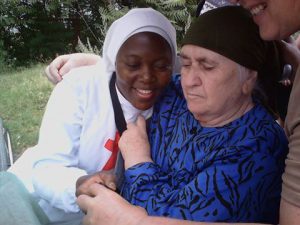 The Bible itself, however, warns us about visits to the sick that are hypocritical or counter-productive. First and foremost, Psalm 41 begins by praising those who visit the sick: ‘Happy are those who are concerned for the poor; the Lord will help them when they are in trouble’, but immediately afterwards narrates to us the complaints of a sick man who has received a visit: ‘Those who come to see me are not sincere; they gather bad news about me and then go out and tell it everywhere’. Even stronger is the complaint made by Job who, reduced by illness to looking like a leper and for this reason thrown by his wife into a hovel, is visited by his friends whom in the end he defines as ‘doctors who can’t heal anyone’ (Jb 13:4); ‘the comfort you give is only torment’ (Jb 16:4); ‘you cover up your ignorance with lies’ (b 13:4); ‘people who are troublesome and enemies’. The error of Job’s friends, which is often the error that we ourselves commit, lies in presenting themselves to the sick man as his ‘saviours’, in the belief, that is to say, that they know, better than the sick man himself, what he should do. But he who visits a sick person must only try to share, as far as this is possible, their powerlessness and weakness, remembering that a bedside is not the place for a sermon or a lesson in morality or theology. It is the patient who must allow himself to guide the visit; it is he who must be allowed to speak; it is he who is the teacher that must be listened to – it is with him that Christ identifies, not the visitor.
The Bible itself, however, warns us about visits to the sick that are hypocritical or counter-productive. First and foremost, Psalm 41 begins by praising those who visit the sick: ‘Happy are those who are concerned for the poor; the Lord will help them when they are in trouble’, but immediately afterwards narrates to us the complaints of a sick man who has received a visit: ‘Those who come to see me are not sincere; they gather bad news about me and then go out and tell it everywhere’. Even stronger is the complaint made by Job who, reduced by illness to looking like a leper and for this reason thrown by his wife into a hovel, is visited by his friends whom in the end he defines as ‘doctors who can’t heal anyone’ (Jb 13:4); ‘the comfort you give is only torment’ (Jb 16:4); ‘you cover up your ignorance with lies’ (b 13:4); ‘people who are troublesome and enemies’. The error of Job’s friends, which is often the error that we ourselves commit, lies in presenting themselves to the sick man as his ‘saviours’, in the belief, that is to say, that they know, better than the sick man himself, what he should do. But he who visits a sick person must only try to share, as far as this is possible, their powerlessness and weakness, remembering that a bedside is not the place for a sermon or a lesson in morality or theology. It is the patient who must allow himself to guide the visit; it is he who must be allowed to speak; it is he who is the teacher that must be listened to – it is with him that Christ identifies, not the visitor.
The posture of the person who helps must be correct; one cannot keep standing looking at the patient from above – one must place oneself at the level of his eyes, in order to communicate comfortably with him. A visit, in addition, is not only made up of words – it is also made up of silences, of looks, of prayer, and of listening, trying to understand the non-verbal messages that the sick person transmits to us as well. In more serious situations one can communicate with one’s eyes, with one’s hands, with a look, and with touch. Nor can we address banal words to the patient, for example: ‘you’ll see, you’ll soon be back home’ if he is in a hospital and in a very bad way, or ‘you look better’, while when we have gone out of the room we comment in a very different way: ‘did you see how bad he was?’; ‘poor man, he has not got much time to live’; or we utter phrases that shut down the insistent questions of the patient: ‘but what are you saying, don’t say such things’. In all these situations, a sick person sees his visitors as enemies, he senses their duplicity and falsehood, and for this reason he becomes depressed and gets irritated, like Job did. After making these necessary clarifications, not to discourage but to emphasise at a deeper level the fertile but also risky meaning of a visit to the sick, I will end with a splendid beatitude addressed by St. Camillus to those who visit or help the sick with the heart of a mother: ‘Blessed and happy will you be if you can be accompanied to the tribunal of God by a tear, a sigh, of these sick poor people, because you will enjoy Him eternally’.
Father Rosario Messina



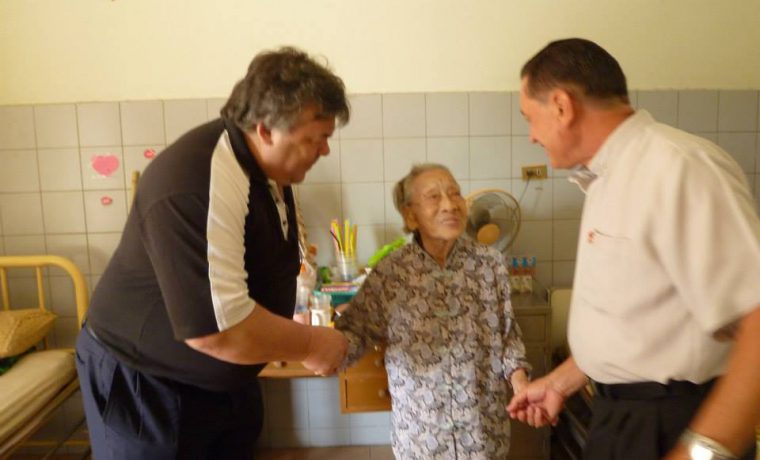



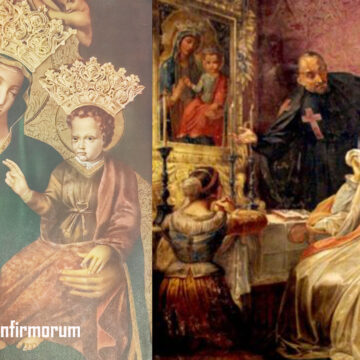

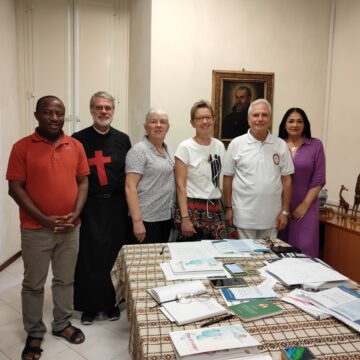

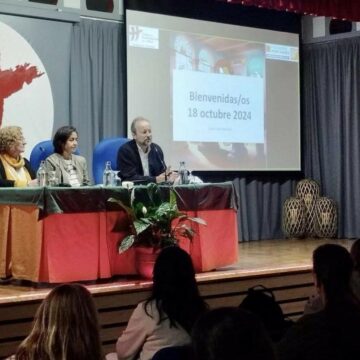

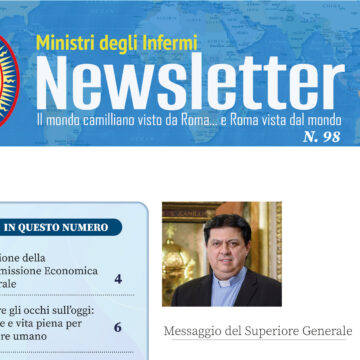
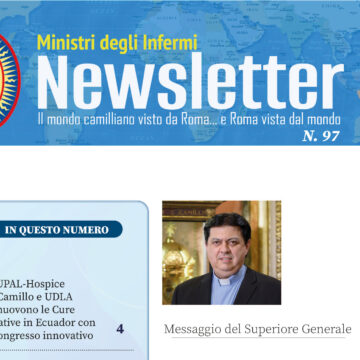
Camillians on Facebook
Camillians on Twitter
Camillians on Instagram